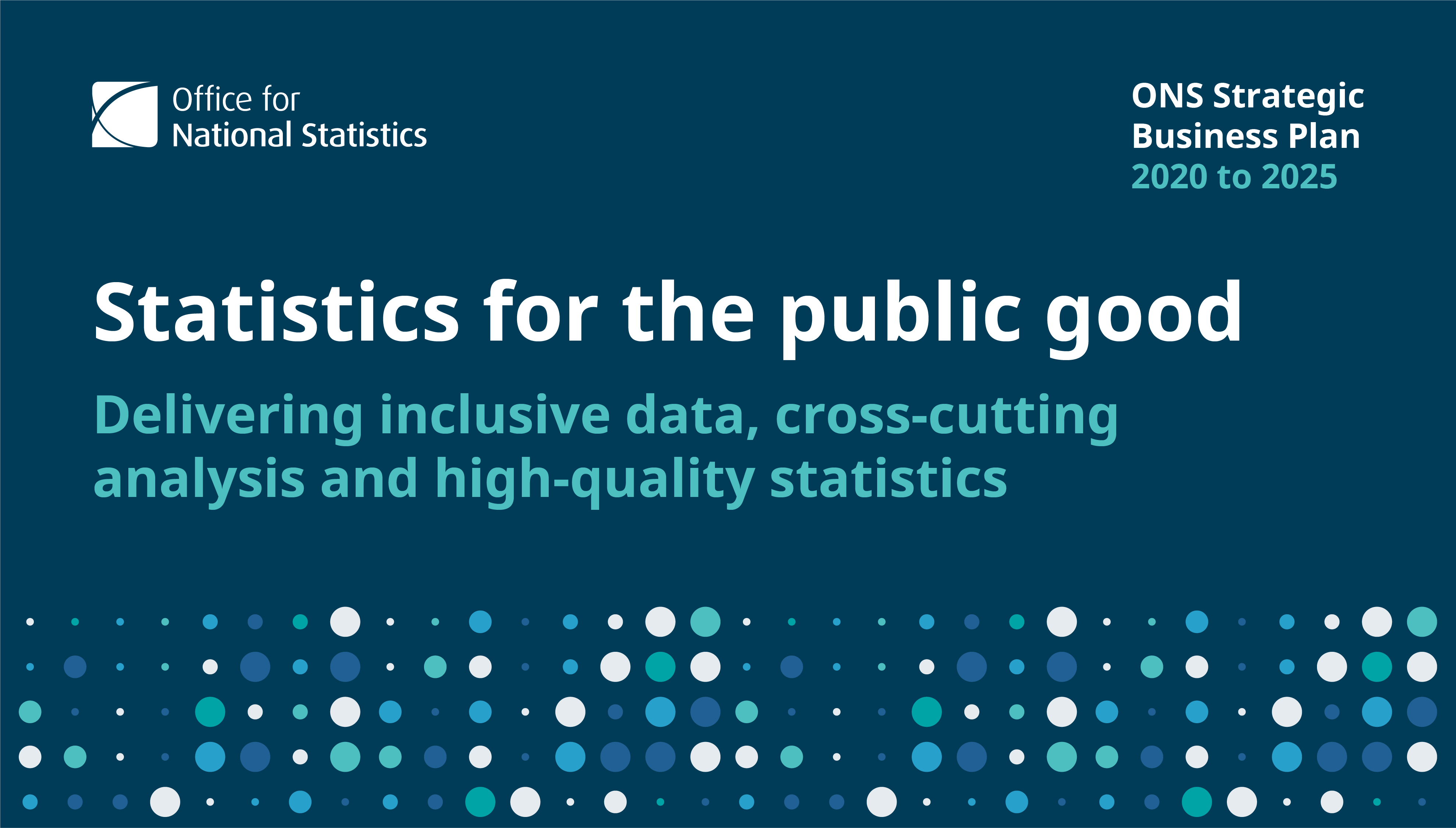2021/22 Performance Summary
2021/22 was the second year of the UK Statistics Authority’s (UKSA) five-year Strategy ‘Statistics for the Public Good’ and the ONS’s Strategic Business Plan. We have made significant progress and delivered a wide range of notable achievements while continuing to address the challenges posed by the COVID-19 pandemic on our outputs, organisation and people.
More information on performance against the 2021/22 Key Milestones can be found in Annex A, and the 2021/22 Annual Report and Accounts. A link will be available once it has been published in July 2022 after its been laid before Parliament. However in brief they include:
- We achieved a 97% response to the 2021 Census, exceeding our target of 94%, reflecting the quality of our preparations for the field work and execution during a national lockdown. We also developed new research publications on administration data-based population estimates, and delivered feasibility research on administration data-based labour market status.
- The alpha build of the Integrated Data Services Programme Analysis Platform was quickly followed by the launch of an initial Private Beta in October 2021 which was accessible to analysts across government, with pilot projects used to test and demonstrate new capabilities such as data virtualisation.
- The Ambitious, Radical and Inclusive Economic Statistics Programme (ARIES) has continued to deliver improvements to the core national accounts, trade and investment and the faster indicators suite, and has delivered significant improvements to GDP outputs including double deflation. Experimental model-based estimates of regional GDP have improved regional economic data and made economic growth changes available five months earlier.
- We have continued to deliver “gold standard evidence” in the form of the COVID-19 Infection Survey (CIS) that informed the response to the pandemic including significant regional variations and, going forward, will be the main source of information for managing the pandemic. The scope and nature of the evidence produced through CIS flexed in response to need, including the publication of two estimates a week during the emergence of the Omicron variant in December and January. Associated data on behavioural responses, workforce absences and impact on household finances and living standards have also been delivered.
- We have responded to urgent data priorities such as:
- supporting the statistical and data requirements for the Union.
- building an analysis of the upcoming statistical requirements for the levelling up agenda
- supply chain disruption, publishing analysis on HGV drivers and providing the Cabinet Office with the latest data and information impacts on availability of essential goods to inform decisions.
- developing an evidence pack that synthesises cross government data on Violence against Women and Girls
- working closely with the Office for Veteran Affairs to improve veteran suicide statistics, data collection and analysis.
- we also published the GSS subnational data strategy.
- We used new data and methods to incorporate the Test, Trace and Vaccinations Programme into measures of healthcare output in the National Accounts, and stood up an Over 50s Lifestyle Survey in just 11 days after cross government collaboration to design, test and launch the survey of 20,000 workless 50-70 year olds.
- A new National Statistician’s Committee for Advice on Standards for Economic Statistics (NSCASE) was established to provide statistical governance outside the European framework, and we published the Sustainable Development Goals (SDG) annual report, making good progress on reporting indicators, closing challenging data gaps, doubling the amount of headline data reported and increased disaggregation.
- We have expanded our collaborative partnerships including the launch of a strategic partnership with the Alan Turing Institute, worked with the Department for Education on their Unit for Future Skills, and delivered research through the ESCOE partnership.
- We decided to invest in an expanded the Policy Liaison Unit to better reflect the data needs of policy makers.
- A prototype UK Climate Change Statistics Portal was launched ahead of the COP26 UN Climate Change summit in Glasgow and showcased at the summit with the Met Office, providing a dashboard of indicators, three ‘explainer’ articles and access to detailed data. We also completed a coordinated programme of 10 climate related statistical and analytical outputs around COP26 covering emissions in 2020, energy efficiency of homes, business actions, local authority emissions and woodland cover, low emission vehicles and UK natural capital estimates.
- The Inclusive Data Taskforce consultation published a detailed implementation plan responding to the 46 specific recommendations of the Inclusive Data Taskforce following extensive engagement and collaboration.
- The National Statistician’s Expert User Advisory Committee met for the first time on 28 March and discussed the Integrated Data Service, the ONS website, and priorities for transforming access to data and statistics to improve the user experience.
- We convened, in November 2021, a summit on public engagement with a range of groups working on administrative data use, most notably in heath, and have a programme to improve both public engagement and decision making in data use.
- Within the Data Science Campus, we delivered a series of Masterclasses for Ministers, Select Committees, Permanent Secretary and Senior Leaders across government strengthening data literacy across leaders, launched the cross government Data Science Graduate Programme, and developed real time indicators at the local level from CCTV traffic camera images which was awarded the Geography in Government overall and innovation awards. These regularly published statistics are the first to be produced from machine learning techniques applied to image data.
- We worked with partners across government to set up the new Darlington Economic Campus, to have a presence in the North East of England, aligned to the Levelling Up and Northern Powerhouse agendas and confirmed our move from Drummond Gate to Marsham Street, as part of the wider Civil Service aim to consolidate its office estate in London. We have also transformed our estate in alignment with the Government Property Unit standards and engaged actively with the Places for Growth Agenda – including active engagement and support for the Darlington Economic Campus.

